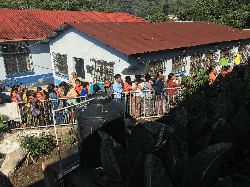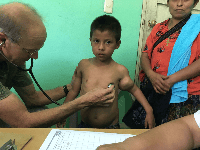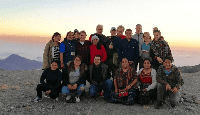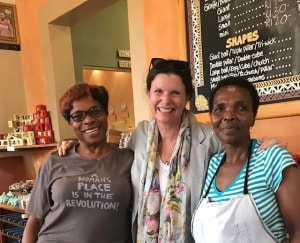Hello All!
Peace Corps Volunteer Todd Peterson, while serving in a remote area of Guatemala, saw that the villagers in the area had a need for surgical care but were unable to obtain it. When his father, Frank Peterson, visited Todd, he noticed the lack of a framework between the remote rural communities of and the volunteer medical and surgical missions in Guatemala. In 2001, the Petersons’ formed the volunteer organization Partner for Surgery to address the medical and surgical needs of provincial Guatemala.
Ellen Davis-Zapata, a former Peace Corps Volunteer who served in Guatemala, and who is a veteran of many international volunteer missions. has volunteered with Partner for Surgery. She is also a member of the organization’s board of directors. In her article, Mission in Guatemala, Ellen describes her fulfilling experiences as a Partner for Surgery volunteer in rural Guatemala.
Enjoy the article.

Medical Mission in Guatemala
After my Peace Corps service in Guatemala from 1992-1994, I continued to be connected to my country-of-heart and found many reasons to return. Finally, in 2007 a close friend retired to a beautiful home in Antigua Guatemala. This became my home away from home.
My friend began working with Companero para Cirugia (Partner for Surgery) and I soon became a volunteer as well. CpC is a Guatemalan non-profit organization founded by the father of a Peace Corps volunteer in 2008 to work together with national and international medical and surgical volunteer teams to provide health and surgical services to needy people who suffer from high poverty rates, low education, high incidence of birth defects, and poor health. I have now participated in three triage missions with CpC.

A typical medical mission starts early on a Sunday morning when the team boards the 15 person van and a pickup truck leaving from the CpC offices loaded with people, equipment, and supplies. The team consists of social workers, nurses, CpC staffers, two doctors from the U.S. or Canda, who have volunteered and paid to spend the week working in the mission, and me and another interpreter. We will drive at least 8 to 10 hours to our first location where we spend the night waking early to get to the first clinic where people are patiently waiting for us.
The social workers who live and work in the most remote areas of the country have organized and advertised this triage mission. Many people have had his/her medical condition for long periods of time, some are children or adults with birth defects, most would never be able to resolve the problem without a mission of this sort.

We set up makeshift examining rooms and start seeing patients. The doctors are skilled, compassionate, and genuine in their concern. My job of interpreting from Spanish to English is not difficult as it is focused and specific. Usually, there is a third language involved because we are working in remote indigenous areas and there is another interpreter to help us communicate.
At the end of the week, we will have repeated this scenario three more times in three different locations. In my last mission, we saw almost 800 patients in four days including 235 breast and cervical screenings with the treatment provided for positive screens. Several breast cancer tests were ordered, and around 175 general surgeries scheduled to take place in either Antigua or Guatemala City in the future.
CpC is a unique program for its care for patients before and after surgery. Not only do the social workers check up on patients to be sure they are taking their medications and/or vitamins and keeping healthy for surgery, but they accompany them from their homes to the surgery and see to them returning home plus monitor them afterward. Many of these people have never been out of their communities and would have trouble managing travel. No other NGO (non-governmental organization) in Guatemala works with this program model.
And, their surgery is mostly free, performed by another set of volunteer doctors who come to Guatemala during surgical missions set up by CpC.

I love this work on so many levels. I meet people who are dedicated to improving the lives and health of people who have no other resources. Besides working long hours and evaluating patient after patient, with little time in between, we have fun getting to know each other and sharing stories. I am humbled by the patients I meet who are so courageous and strong, so patient and wise, and who accept life on life’s terms asking for little.
At the end of the mission we are all tired, i am weary of trying to speak Spanish, and we are ready to go back home. Some of the social workers have been away from their families and homes, which is not typical in Guatemala. We are happy with what we have accomplished and we are confident that each of the patients will have a good outcome. I feel like I have helped a little and gained a lot.
I once asked one of the Canadian doctors what he thought of the medical missions and he responded, “It made me remember why I became a doctor.” In one way or another, doctor of not a doctor, this is how we all feel.
For more information, see PartnerforSurgery.
Photo credits: Ellen Davis-Zapata




